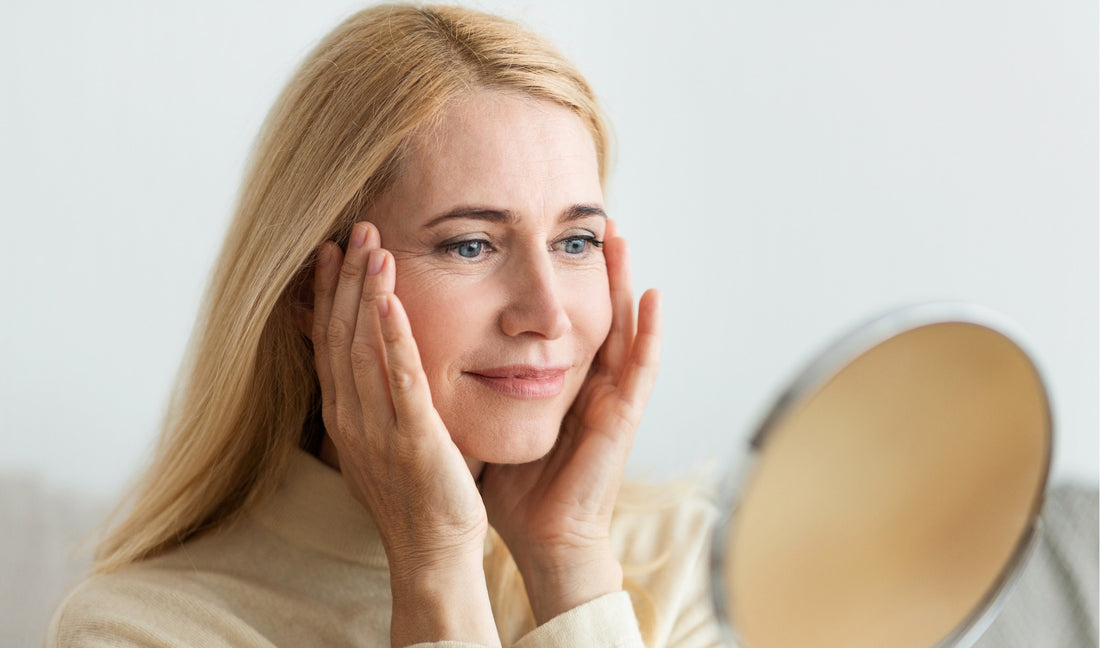
How skin ages: Exploring the causes of aging skin and what you can do against them
The aging process is inevitable, and our skin is no exception. As we age, our skin undergoes various changes that can impact its texture, tone, and overall appearance. Intrinsic factors such as genetics play a role in the aging process, but extrinsic factors such as sun exposure, pollution, and lifestyle habits also contribute to the development of aging skin. In this blog post, we will explore the causes of aging skin and the science behind these changes. We will also discuss what you can do to combat the signs of aging and maintain healthy, youthful-looking skin.
Intrinsic Factors
Intrinsic aging, also known as chronological aging, refers to the natural aging process that is determined by our genetics and occurs over time. As we age, our skin naturally undergoes several changes that contribute to the development of wrinkles, fine lines, and other signs of aging.
One of the key changes that occur in the skin with age is a decrease in collagen and elastin production. Collagen and elastin are essential proteins that provide our skin with structure and elasticity, and as we age, our body’s ability to produce these proteins decreases. Thereby, the skin becomes thinner and more fragile, leading to wrinkles, fine lines, and sagging.
Another factor that contributes to intrinsic aging is a decline in the production of hyaluronic acid. Hyaluronic acid is a natural substance that helps to keep our skin hydrated and plump. As we age, our skin’s ability to produce hyaluronic acid decreases, which can lead to dryness, fine lines, and wrinkles.
Genetics play a significant role in the aging process. Some people are genetically predisposed to age faster than others, and certain genetic factors can influence the development of age-related skin changes. For example, people with a family history of premature aging are more likely to develop wrinkles and fine lines at a younger age.
Unfortunately, there is little that can be done to change your genes. However, by understanding your genetic predisposition, you can take appropriate steps to minimize the impact of aging on your skin.
Extrinsic Factors
Extrinsic aging refers to the aging process that is caused by external factors, such as sun exposure, pollution, and lifestyle habits. These factors can contribute to the development of premature aging and skin damage.
Sun exposure is one of the primary extrinsic factors that contribute to aging skin. Exposure to UV (ultraviolet) radiation from the sun can cause damage to the skin cells, leading to wrinkles, fine lines, and age spots. UV radiation can also break down collagen and elastin in the skin, which can lead to sagging and loss of elasticity. To prevent sun damage and the risk of skin cancer, it’s essential to wear sunscreen with a high SPF rating daily and avoid prolonged exposure to the sun.
Additionally, excessive exposure to High Energy Visible Light, better known as blue light, can be harmful to your skin. To read more about the negative effects of blue light click here to read our blog post about it.
Pollution is another factor that can contribute to aging skin. Environmental pollutants, such as cigarette smoke, smog, and industrial chemicals, can damage the skin cells and cause inflammation. Inflammation can lead to premature aging and other skin issues, such as acne and rosacea.
Air pollution, in particular, can lead to the formation of free radicals in the skin. Free radicals are unstable molecules that can damage the skin's cells, leading to wrinkles, age spots, and a loss of elasticity. To protect your skin from pollution, it’s important to cleanse your skin thoroughly and use skincare products that contain antioxidants, such as astaxanthin and vitamin C and E, which can help to neutralize free radicals, reduce inflammation and protect the skin from damage.
But also lifestyle habits can impact the aging process. Factors such as a poor diet, lack of sleep, smoking, and excessive alcohol consumption can all contribute to premature aging.
A diet that is high in sugar and processed foods can lead to inflammation and damage to the skin cells, while a lack of sleep can contribute to dark circles and fine lines. Smoking is a significant contributor to premature aging, as it can cause damage to the collagen and elastin in the skin, leading to wrinkles and sagging. Excessive alcohol consumption can contribute to the formation of free radicals in the skin.
In conclusion, there are several factors that contribute to the development of aging skin, both intrinsic and extrinsic. While there is little that can be done to change our genetic makeup, there are steps we can take to protect our skin from extrinsic factors such as sun exposure and pollution. By adopting a healthy lifestyle, using sunscreen daily, and taking care of our skin with quality skincare products, we can help slow down the aging process and maintain a youthful, radiant complexion for years to come. It is never too early or too late to start taking care of your skin!
To keep up with latest news on skin health and Tomorrowlabs product innovations, check out our Instagram @tomorrowlabs.eu